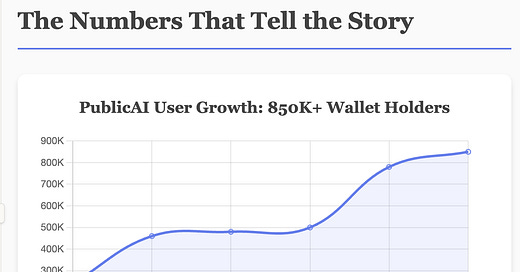Remember when Google paid Reddit $60 million just to use their posts for AI training? That was the moment everyone realized something big was shifting. Your tweets, your Instagram captions, your thoughtful LinkedIn posts - they're not just social media content anymore. They're training material for the next generation of AI, and they're worth serious money.
PublicAI, a company that most people haven't heard of but probably should have, quietly built something that's got 850,000 people signed up to get paid for contributing their data to AI training. And the growth numbers? They're kind of wild.
In just over a year, PublicAI has gone from a few thousand users to 850K+ wallet holders. But here's what's really interesting - the type of data they're collecting is exploding
ChatGPT conversation datasets grew 414% in the last year. Think about that for a second. People are voluntarily sharing their AI conversations to help train better AI models, and they're getting paid for it.
Audio datasets? Up 12,400%. Voice and audio content is becoming incredibly valuable as AI models get more sophisticated.
Even their tweet datasets grew 271%. Twitter/X posts that might get a few likes are now worth something in the AI training economy.
The AI Data Nightmare
OpenAI spends $700,000 every day just to keep ChatGPT running, and a huge chunk of that is data-related costs. Meanwhile, lawsuits are piling up from content creators who want their cut.
The traditional approach - scraping everything from Common Crawl and hoping for the best - is starting to feel risky. What if that well runs dry? What if the legal challenges actually stick?
PublicAI represents something different: consensual, high-quality data where the creators are already compensated. Sure, it might cost more upfront, but it could save you millions in legal fees down the road. Plus, the data quality might actually be better since people are incentivized to contribute their best stuff.
What This Means for Different Players
If You're a Brand Manager
GPT responses are becoming people's primary source of information. When someone asks ChatGPT about your industry, your company, or your products, what does it say?
Traditional social listening tools only capture what's happening on individual platforms. But PublicAI is aggregating conversations across Twitter, Telegram, ChatGPT interactions, and more. That's a much fuller picture of how people actually talk about topics related to your brand.
More importantly, this represents a new channel you need to think about. Just like you optimized for Google SEO, you might need to start thinking about "GPT SEO." How do you make sure AI models have accurate, positive information about your brand?
If You Create Content
This one's personal. Your tweets, your blog posts, your videos - they're training the AI systems that might eventually compete with you. Doesn't that feel a bit weird?
PublicAI is betting that creators will want a piece of that value. And with 850K people signing up, it seems like they're right. These aren't just random people - they're creators who understand that their content has value beyond just platform engagement metrics.
Instead of just relying on YouTube ad revenue or Instagram sponsorships, you could also monetize your content's training value directly.
The Bigger Picture
What's really happening here is a fundamental shift in how we think about content value. For the last decade, the deal was simple: you create content, platforms give you audience access, platforms keep the data value.
PublicAI is essentially saying "what if creators got paid for the data value too?" And the growth numbers suggest that resonates with people.
But here's where it gets interesting from a strategic perspective. This isn't just about fairness or creator economics. It's about data quality and legal risk.
When people voluntarily contribute content for compensation, they're more likely to contribute their best stuff. When they're getting scraped without permission, you get whatever happens to be publicly available - which might include a lot of noise, spam, or low-quality content.
Who Else is in the Training Data Game?
What Happens Next?
For everyone else, the key is recognizing that this shift is already happening. The question isn't whether the data economy will change - it's how quickly you adapt to the new reality.









